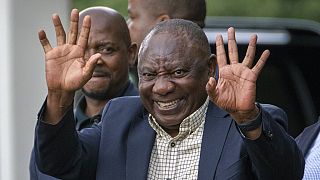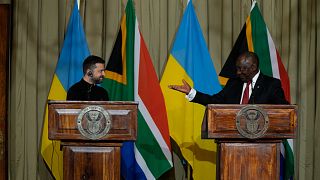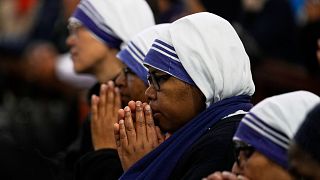South Africa
South Africa's Democratic Alliance took the African National Congress, the party it co-governs the country with, to court Thursday over a preelection speech in May given by President Cyril Ramaphosa.
It's an early sign of friction between the new coalition partners. The court papers were submitted to the Electoral Court by the DA in May before it entered into a coalition with the ANC, but it decided to still go ahead with the case.
The DA asked the court to deduct 1% of the vote received by the ANC in the May 29 national election and fine Ramaphosa, the ANC leader, $10,900 and his party $5,450, over what it argues was a presidential address that was used for election campaigning and amounted to an abuse of office.
The ANC responded Thursday by calling the DA's legal action “frivolous and unwarranted" and said the president was following the constitution when he made the speech.
Ramaphosa gave the speech three days before the election in his capacity as head of state, but used parts of it to highlight what he said were ANC successes during its 30-year rule as South Africa's governing party. The DA said that election rules don't allow him to engage in party politics and campaign for the ANC when he speaks as the president.
The ANC lost its long-held majority in the historic election when it received just 40% of the vote. That forced it to create a coalition government for the first time to run Africa's most industrialized country. The DA — the second biggest party with 21% of the vote — is one of seven parties represented in Ramaphosa's Cabinet despite previously being the ANC's fiercest critic.
The coalition, referred to as a "government of national unity," created a new political landscape for South Africa after the ANC had governed since the end of the apartheid system of white minority rule in 1994. The election was the first time in South Africa's young democracy that more people voted for other parties, stripping the organization once led by Nelson Mandela of its dominance.
The left-leaning ANC and the centrist DA are the key parties in the coalition but them working together was seen as unlikely given their stark ideological differences and history of opposition to each other. They have largely managed to project a sense of unity over the last month since the coalition was agreed.










00:54
Zelenskyy Cuts South Africa Visit Short After Deadly Strikes on Kyiv
Go to video
Unprecedented trial for apartheid atrocities opens in South Africa
Go to video
South Africa's tax row heads to court as implementation date nears
Go to video
South Africa appoints Mcebisi Jonas as special US envoy in bid to ease tensions
44:40
South Africa’s diplomatic gamble: strategic defiance or risky isolation [Africanews Debates]
Go to video
South Africa's President rejects Musk's 'white genocide' claim